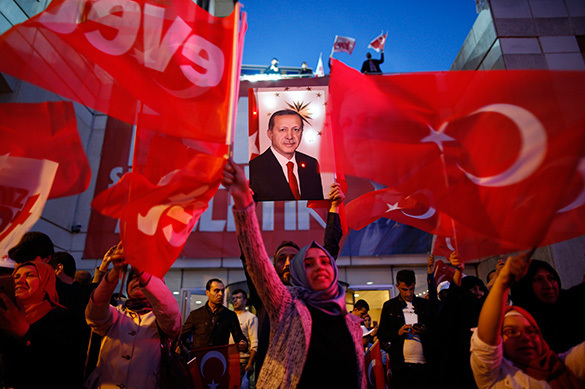What kind of a Turkey is expected to come from the aftermath of the referendum?
With the referendum of April 16, Turks gave their consent to the proposed changes to the constitution. Even though the opposition party has some objections to the way the referendum was done, the discussions in and outside Turkey are mainly focused on the fact that Turkey is on the verge of a new era...

The world public is curious about two things:
First, what are the pros and cons of the new system for Turkey?
Second, what kind of foreign policy will Turkey pursue from this point forward? Will there be any difference in the approach to friends, neighbors, allies, or other countries? What about relations with Russia, Europe, and the US?
Before answering these questions, it would be useful to shed some light on the approved changes to the constitution. First of all, contrary to some claims of some dissidents, the new system is not going to be a dictatorship or a sultanate.
The new system is nothing other than an adapted version of the presidential and semi-presidential systems currently seen in many countries. The only difference is that it is not going to lead to federalism or autonomy, and it will preserve the unitary structure of the country. Furthermore, it will allow the president to be affiliated with a political party. This is the most crucial point in terms of the stability and well-being of an independent and strong Turkey.
In the new system, the 'partisan president' will be elected in democratic elections and will not be able to hold this position for more than two terms. As the 'President', the head of state will have broader powers. However, the elected Parliament will have the power to investigate and remove him from power if necessary.
It would be great if the new constitution were prepared without leaving even an inch of room for doubt, ambiguity or controversy, and if it were more clear, better defined. However, it will have to be perfected over time, since it was prepared with urgency, to quickly solve current problems and meet the needs of Turkey. Without a doubt, the problems and needs that become visible as the constitution is implemented, as well as proposals, criticism and reactions, will be taken into account. New revisions and improvements can once again be taken to people with a referendum.
Therefore, it is fair to say that the new system will contribute to the development, security and stability of Turkey. After all, what is being done is giving more power to a leader elected by the people so that he can have more flexibility.
This way, red tape will be cut and destructive detraction and unnecessary procedures will no longer hamper services from being implemented rapidly. The new system will make it easier for the elected leader to carry out his duties and fulfill his promises.
All of that will contribute to a stronger, safer and more stable Turkey. It will also instill more confidence in Turkey's friends and allies, strengthen mutual benefits and boost existing alliances.
Furthermore, Turkey's rapprochement process with her friend and neighbor, Russia, will speed up as well. Turkey becoming a stronger and more stable country in the region will also benefit her natural ally Russia economically, politically and strategically - just like Russia being a strong country and President Putin being a strong leader benefits Turkey.
The fact that President Putin called President Erdogan to congratulate him on referendum results is a clear indication the outcome is best for the mutual interests of the two countries.
As for relations with the EU, the same positive outlook regrettably doesn't apply to this arena. Although Turkey more than kept her end of the bargain to join the EU, the EU has been clearly stalling her for decades.
Needless to say, neither the European people nor the individual countries are to be blamed for this situation. The deep circles within the EU, the same ones that pursue sanction and isolation policies against Russia, choose to keep Turkey outside the union but refrain from clearly saying that it will not accept Turkey.
Nevertheless, Turkey will maintain its well-intentioned, constructive and reconciliatory approach after the referendum. However, it is troubling that the ungracious campaign before the referendum across mainstream European media against President Erdogan and the Turkish people continued increasingly after the referendum.
Here are some examples of the biased news reports on the England leg of the EU media that carried out divisive provocations, almost seeking to fuel civil war in Turkey:
The Economist: "Turkey is sliding into dictatorship"... Financial Times: "A bitter victory for Turkey's new sultan"... Independent: "Deep divisions make Turkey prey to its potential enemies "...
Some biased news reports on the German media are as follows:
Bild: "German Turks voted for a despot"... Spiegel Online: "Turks voted to give more power to their autocratic president"... Frankfurter Allgemeine: "In wild Erdoganistan"...
Swiss TV channels, on the other hand, didn't refrain from broadcasting scandalous programs debating 'whether Erdogan was feeding terrorism in Europe'.
Many other EU countries have also seen their media make similar biased and opposing comments. Therefore, despite Turkey's best intentions and the democratic elections that were held, the deep EU mechanisms are even more aggressive and brazen than before. And this makes Turkey-EU relations even more strained.
At the end of the day, in the aftermath of the referendum, Turkey will not have any quarrels with or hard feelings towards any of the European countries, the US, or their people. However, it is more than clear that deep structures that attack states and leaders, who refuse to be pawns to its imperialist system, have serious problems with Turkey, Russia, the US, President Erdogan, President Putin and President Trump. Then what is the best course of action other than these three leaders building a strong alliance against their common target?
Harun Yahya
Turkey
Subscribe to Pravda.Ru Telegram channel, Facebook, RSS!


